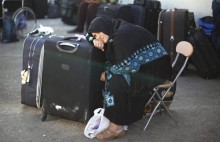The Egyptian military seem to have finally decided to show who the boss is in the country. This is perhaps the best explanation for the actions of the Egyptian security forces which cleared the other day two camps occupied by supporters of the deposed president Mohammed Morsi. The police blocked the adjacent streets and then began to ruin the camps, using bulldozers and tear gas, while helicopters hovered over the tents, the BBC reports. Muslim Brotherhood representatives claim that the police raid against the camps in Cairo left over 100 pro-Morsi protesters dead, France Presse reports. Journalists say there are two law-enforcement officers among those killed.
It will be recalled that Morsi’s supporters were staging sit-ins in tent camps for several weeks, demanding that he be reinstated as president after being overthrown by the Egyptian army on April 3 this year. The camps were set up near the mosque Rabaa al-Adawiya in eastern Cairo and on Nahda Square in the city’s western part one and a half months ago. Since then, clashes between president Morsi’s supporters and adversaries have claimed more than 250 human lives.
Incidentally, Morsi’s supporters livened up on Tuesday, when they marched from Nahda Square to the governmental compound in protest against the appointment of several army officers as provincial governors.
Shortly before this, Egypt’s Foreign Minister Nabil Fahmy had told the BBC that “the stand-off cannot continue endlessly” and that the authorities were trying to reach an agreement with the protesters through dialogue. “If security forces start applying their procedures, they will do that by court order according to the law and according to the standards allowed by the law,” Fahmy emphasized.
The Day requested Ihor SEMYVOLOS, executive director, Center of Middle Eastern Studies, to comment on the latest events in Egypt.
“When the military coup began, I said it was a very dangerous thing. For, once the hostilities have begun, it is very difficult to forecast further developments. The Egyptian military have opted for a strong-arm scenario, perhaps thinking that they control the situation because their institution is the most powerful. It is by and large true. It is difficult to dispute this. There is a face-off between the two powerful groups of interests – the military and the Muslim Brotherhood – in Egypt today. The military are winning in this face-of. But this also means the end of the Egyptian state and largely complicates the making of any procedures that will let that country exist under a more or less democratic regime. In all probability, as my colleague Aleksandr Bogomolov aptly noted, what can be a role model for Egypt is only Pakistan, where there are some democratic procedures but the military strictly control the situation. This also includes some other things that occur in Pakistan now, such as terrorism, the activity of Islamist movements, and political struggle.
“But it is quite obvious now that Egypt is in a worse, in fact a critical, situation. Obviously, there are no other ways out of this situation than the use of force. And Egypt’s future will depend on how the Egyptians will ride out this critical stage.
“‘Failed state’ means that all the institutions in that country have been destroyed. Meanwhile, the army still remains the most powerful institution, and there are no signs that this institution is breaking up. So I would not say that Egypt is a failed state.
“As for the secular-minded groups, they are not institutions. It is a still-to-be-formed group of interests. The Egyptian army has taken over the initiative as much as it could do so. The secular groups can only be observers, while the face-off is between the Muslim Brotherhood and the army.”
Have the Muslim Brotherhood, which tried to fully usurp power in the country until the military intervened, learned a lesson from what is going on?
“The idea of a zero-sum game, when the winner takes all, is typical of not only Egypt but also of many other countries, including Ukraine. Frankly speaking, I strongly doubt that this experience will prompt anybody to reflect on things. As for the Muslim Brotherhood itself, they have a very traumatic experience. I do not know how the situation will evolve further, for this traumatic experience may cause a part of the Muslim Brotherhood to revert to the violent, terrorist, ways of struggle. What is going on in Egypt, including the military coup, etc., is a dangerous precedent. It is very difficult to foresee the development and the consequences of the situation, for things are changing so fast. While one side is winning today, nobody will guarantee that the other side will not be winning tomorrow. As it is impossible to control everything, the situation may go out of control one way or another.
“As for the military’s plans to call elections, it is good, but the question is how to do this. Elections should be held as a result of certain deals and compromises between the warring sides. This requires at least a dialogue. But what we can see today is totally opposite, and, accordingly, the army had to intervene.”
What can compel the Muslim Brotherhood to opt for a dialogue?
“Paradoxically enough, it may happen that force will compel them to opt for a dialogue. This works sometimes, when you find yourself in a situation that you will either lose everything or receive a part. But in this case the army should take a consistent and tough approach. But to what extent the army is prepared for this action is still open to question.”








